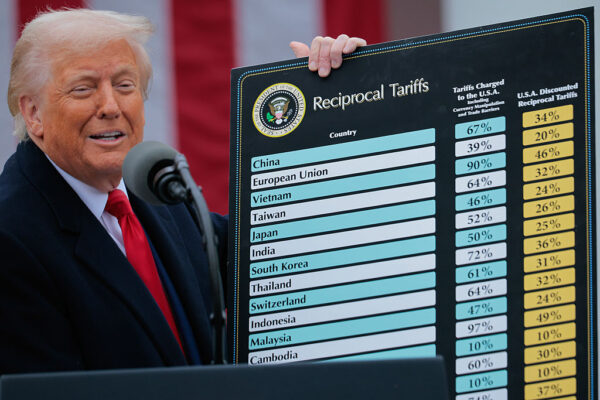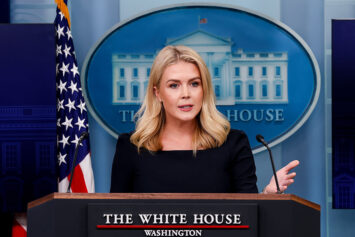Financial markets around the globe spiraled on April 3 as President Donald Trump’s sweeping and controversial new tariffs ignited concerns of a worldwide recession.

The Dow Jones Industrial Average plunged 1,679 points — its largest one-day point drop since the pandemic crash in 2020 — while the S&P 500 fell nearly 5 percent, and the Nasdaq tumbled almost 6 percent, led by sharp declines in usually solid major tech stocks like Apple, Nvidia, and Amazon.
In total, U.S. stocks lost more than $3 trillion in value, a massive reset that caused shockwaves across Asian and European markets. Japan’s Nikkei suffered a second straight day of losses, and the pan-European STOXX 600 index fell 2.6 percent.
At the heart of the financial turmoil: Trump’s announcement of a 10 percent baseline tariff on all U.S. imports, with even harsher levies for certain countries. China now faces a 54 percent effective tariff, while the European Union will see a 20% hit. Japan and South Korea are also bracing for duties exceeding 20 percent. The tariffs go into effect starting April 5, with some countries facing the full brunt by April 9. He even placed tariffs, laughingly, on two uninhabited islands near Antarctica in the southern Indian Ocean.
What the Tariffs Mean To You.
If upheld, these tariffs could raise retail prices, as businesses pass higher import costs on to consumers. Tariffs increase the cost of importing goods, and businesses often pass those added expenses on to shoppers. If the new tariffs stay in place, everyday items could become more expensive, from electronics to clothing to groceries.
Since outside of Hawaii and Puerto Rico, America does not grow coffee beans, expect to pay more for coffee, according to Axios. Shrimp will go up as 94 percent of the shrimp Americans eat is imported. Chocoalte will get a price hike, and even your Big Mac, since we also import large amounts of beef. Bargain-priced clothing and goods from Shein, Temu, and other Chinese e-commerce giants may soon come with a higher price tag. Electronics, cars, and wine will get hit as well.
J.P. Morgan estimates they could boost inflation by up to 1.5 percent. Alternatively, companies may absorb the cost or shift production, though that’s unlikely in the short term, according to The Hill.
Trump’s Take and Foreign Response
Despite the chaos, Trump remained unfazed. “I think it’s going very well,” he told reporters right after the market dropped. “The markets are going to boom.”
Global leaders responded. France’s President Emmanuel Macron vowed retaliation against U.S. tech giants, and Canadian Prime Minister Mark Carney pledged tit-for-tat tariffs on U.S. auto imports. Meanwhile, Stellantis, maker of Jeep, said it would temporarily pause production in Mexico and Canada due to the disruption.
China announced today it will impose 34 percent tariffs on the U.S imports.
Investors scrambled to store their money in safer assets. U.S. Treasury yields plummeted as demand surged, and the dollar slumped to multi-month lows against the euro, yen and Swiss franc. Oil prices cratered more than 6 percent, while gold spiked to a record high before pulling back.
Additionally, JPMorgan raised its recession forecast for the U.S. to 60 percent, and economists warned the tariffs could shave up to 1.5 percent off U.S. growth this year.




